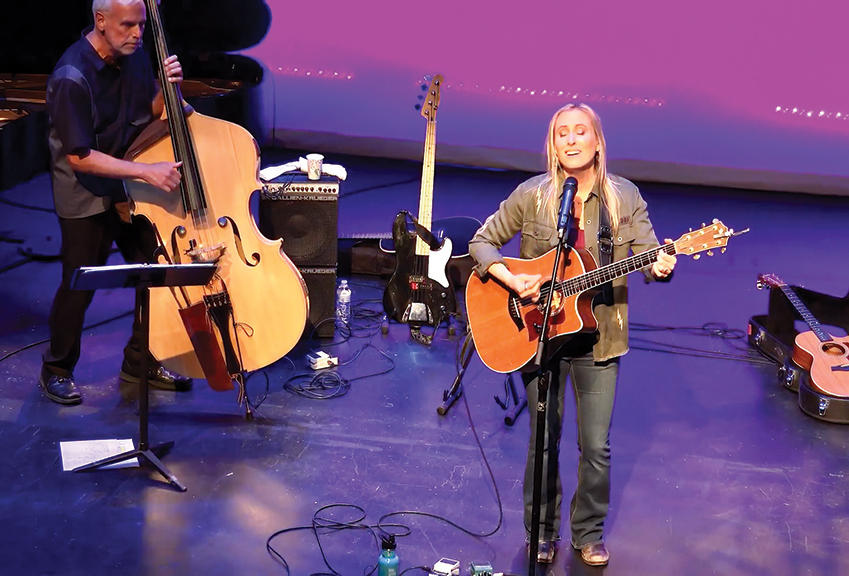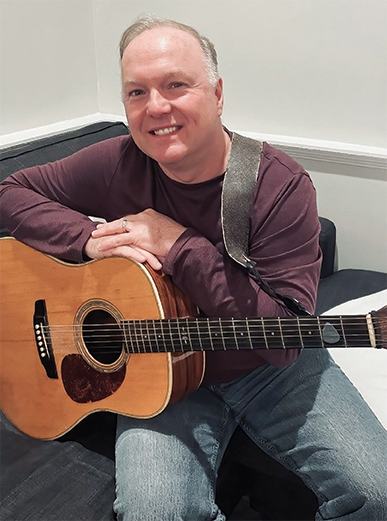I wrote my first song at 15, and it was bleak: “Battery acid stains your teeth/the undertaker sends a wreath/wthey lower you six feet beneath/you scream ‘I’m still alive.’” Eek! But, come on, without youthful angst, would there even be a Billboard chart? Songs—especially sad ones—comfort us all our lives (I’m looking at you, Jackson Browne).
For the songwriters themselves, the creative process is positively cathartic.
Ridgefield has been home to several noted hit-crafters. Andrew Gold (Heatwave, You’re No Good) lived here in the ‘80s and ‘90s. In the early ‘70s, Noël Regney and Gloria Shayne (Do You Hear What I Hear, Goodbye Cruel World) lived on High Ridge. Movie composer Alex North’s score for the 1955 film Unchained yielded the song Unchained Melody, which topped worldwide charts for The Righteous Brothers a decade later.
And do you remember Praise Cheeses? Probably not—it’s one of mine. I’m just one of many local songwriters toiling joyfully in relative obscurity. You might know George Brennan, who provided some music for MTV’s animated ‘90s hit Daria. He recorded This Is My Ridgefield a decade ago, and it’s been celebrated from Ridgebury to the Wilton Line. Elza Libhart (who performs under her first name) played festivals and concert halls and released three albums before settling in town with her husband and co-writer, Reggie, in 2007 to raise a family. She continues to write and record, and her songs are often heard on TV shows. Ridgefield is also home to songsmith Kevin Briody, who served as Connecticut’s State Troubador.
So, how can you, too, convert your feelings and ideas into songs? For some, the process is mystical. Arlo Guthrie jokes about when he and James Taylor were young songwriters. Guthrie recalls remarking on his friend’s seemingly effortless musical prolificacy. “Well,” Taylor said, “the songs are floating by through the air. I just write ‘em down.” “Yeah?” Guthrie replied. “How come, when they’re floating by, you’re always the one with
the pen?”
Finding your inspiration
 Elza, too, cites a spiritual origin to some songs. “There’s a channel you tap into. I do prayer meditation in the mornings, and it keeps the channel open.”
Elza, too, cites a spiritual origin to some songs. “There’s a channel you tap into. I do prayer meditation in the mornings, and it keeps the channel open.”
If you can’t pull songs out of the ether, try a nap. Keith Richards, who makes his home in Redding, famously heard the iconic opening riff to Satisfaction in a dream. At the other end of Fairfield County, a somnolent Paul Simon was visited by the inspiration for his new project,
Seven Psalms.
If you’re seeking more practical guidance, check out the New England Songwriters Retreat, in Chester, CT (its seventh season begins August 25). Acclaimed New England singer-songwriter Ellis Paul founded it to provide the mentorship and community aspiring songwriters need. “In my era in Boston, we were gathering every week at open mics,” says Paul. “It was habitual, supportive, competitive. A lot of people play alone in their basement, don’t share, and they’re not improving. We’ve created an environment where they can have what they need.”
Paul takes his students deep into the mechanics of songwriting. “Of course, you should write what you know and care about. But the focus of our teaching is editing, breaking songs down into parts.” In keeping with the New England singer-songwriter tradition of coffee houses and “listening rooms,” he pays special attention to the lyrics. “You can write songs here that are literate, dense, and quiet.”
The digital revolution, which gives every singer-songwriter instant global reach, is for Paul a mixed blessing. “People can record at home and put music out quickly, but it’s almost impossible to be heard above the noise,” he says. His suggestion? Video. “A video format is more likely to catch on. The inventive people are not inventive songwriters but inventive presenters.”
Get started on your song
 Ridgefield’s Brennan, who has self-recorded five albums (and plans to update This Is My Ridgefield soon), uses social media to see what connects with people. “I track data and cultivate an audience using strategic digital marketing,” says Brennan.
Ridgefield’s Brennan, who has self-recorded five albums (and plans to update This Is My Ridgefield soon), uses social media to see what connects with people. “I track data and cultivate an audience using strategic digital marketing,” says Brennan.
Of course, before you can rack up views, you’ll have to craft your masterpiece. Here are five rules I’ve garnered from the pros and through painful experience:
1. Words first? Music first? Doesn’t matter. If you’re stuck, write new words to a familiar melody, and then alter the melody.
2. Create an arc. Like a good story, a song should end in a different place from where it starts.
3. Put extra effort into the chorus. It’s the part people remember and sing along with.
4. Incorporate variety. Change up the melody and rhythm. Add a bridge. Four minutes of monotony is deadly.
5. Cut mercilessly. In fact, forget four minutes. Make it three-and-a-half. Don’t give them a chance to get bored.
Careful, though because you just might get hooked. I know that Brennan speaks for most songwriters when he says, “I can’t imagine going through life without making music.” •